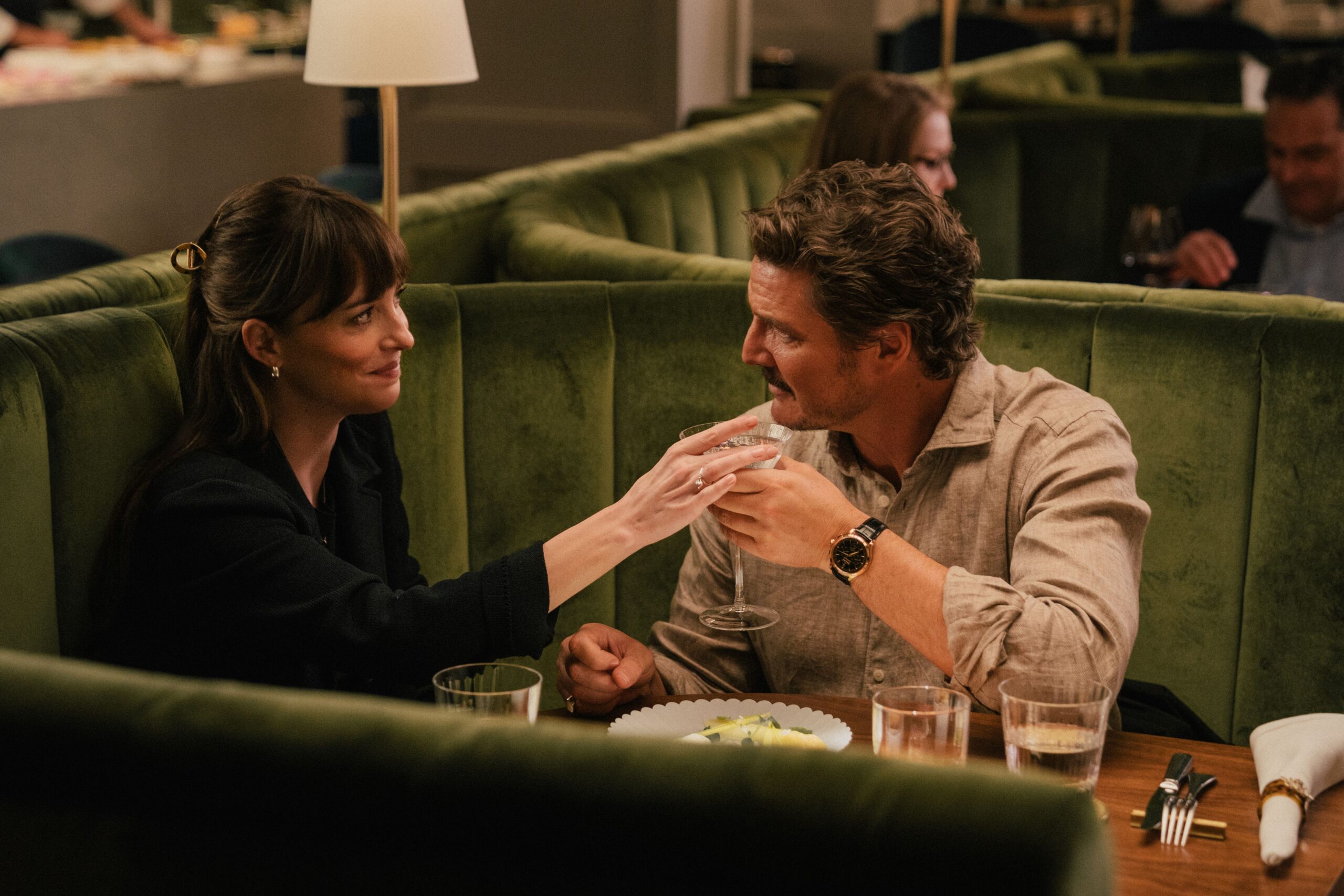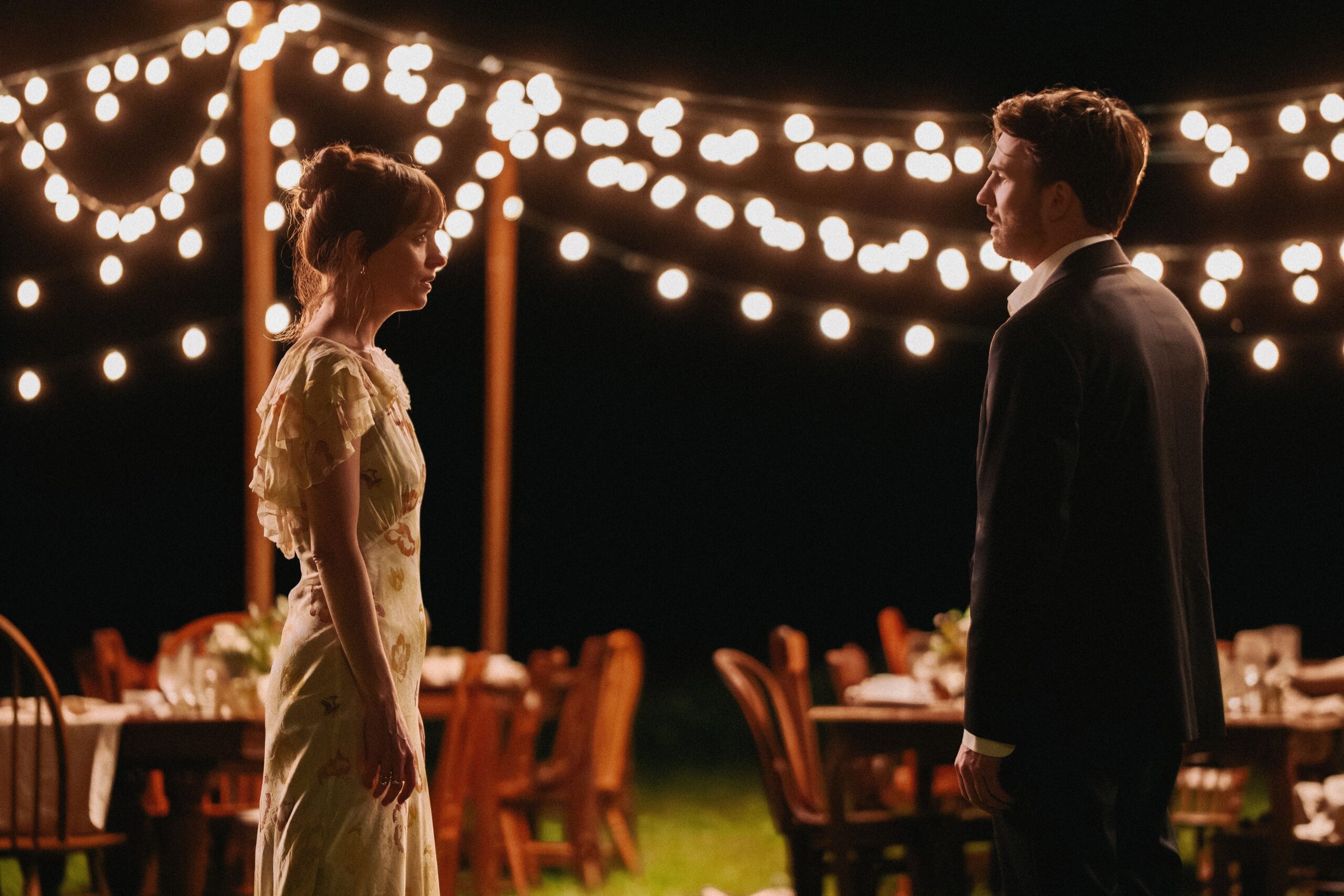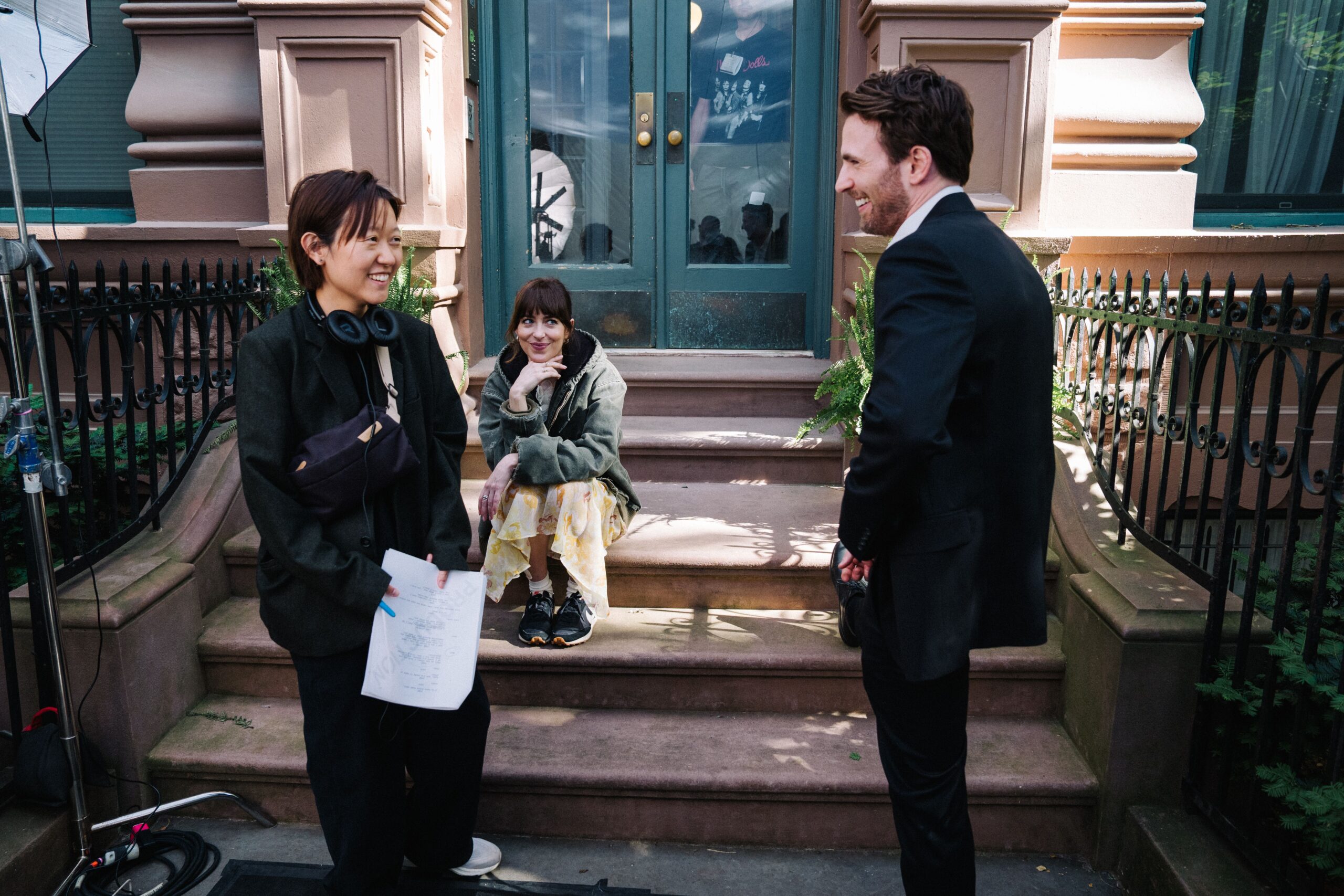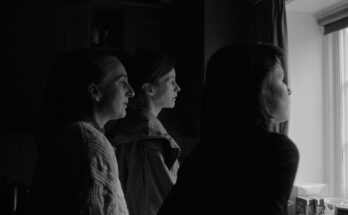Want to hear more from the actors and creators of your favorite shows and films? Subscribe to The Cinema Spot on YouTube for all of our upcoming interviews!
Korean-Canadian filmmaker Celine Song returns with her sophomore feature following her work on her 2023 feature filmmaking debut, Past Lives. Killer Films and 2AM collaborate once again to produce this A24-distributed romantic comedy film. A highly anticipated follow-up, Materialists further showcases the filmmaker’s understanding of love and the conventions found in the romance genre. Sure, the narrative can get humorous in areas. Yet, this film often revolves around modern love and the dating scene—in New York City in Song’s case—insofar as keeping everything grounded within reality.
Materialists is written and directed by producer Celine Song.
In this review, I will discuss Materialists. As this article’s title suggests, no spoilers will be present.
A24’s Materialists Synopsis
According to A24 Press, here is the official synopsis for Celine Song’s romance comedy film, Materialists.
A young, ambitious New York City matchmaker finds herself torn between the perfect match and her imperfect ex.
A24 Press
Discussion
While Materialists‘s narrative structure is different—dividing its overall story into protagonist Lucy’s (Dakota Johnson) profession in matchmaking, her relationship with an upper class man named Harry (Pedro Pascal), and her relationship with an old flame, John (Chris Evans)—, the filmmaker’s rhetorical style for poetic language feels like a signature for what moviegoers and cinephiles can expect from Song. On the one hand, Past Lives is a diachronic study of the soulmates concept referred to as inyeon, i.e., the dynamic between two individuals influenced by thousands of “past lives”.
Yet, on the other hand, Materialists is rather a scrutiny of the matchmaking system based on preferences. For example, never before in this subgenre has the “short king” been a thorough subject of the dating world as much as in Song’s screenplay. She thinks critically about clichés and tropes in romance cinema and subverts them to create an entirely refreshing story. The main external conflict is not a love triangle; the lesser man is not the jealous type; and a couple makes a scene, but just not a good one. This film has comedic scenes from time to time, but Song’s direction allows them to be depicted with gravity.
Materialists has the most potent commentary on value that I have seen since Donald Glover and Stefani Robinson’s writing in an early episode of Glover’s comedy-drama FX Networks series, Atlanta. Just like “Value”, Song stresses the significance of women—not solely men—navigating dating and love in modern America.
Baby, Don’t Hurt Me
The writer-director-producer’s tackling of love is merit-worthy, especially in the subject matter mirroring topics previously covered in the late social critic bell hooks’s All About Love: New Visions, e.g., the possibility of abuse and concealing the truth. However, in this new epoché consisting of dating apps and dating apps and other social media platforms, the metaphysics of love might require a revision in romantic media such as Materialists. Initially, Lucy has a perception of dating and love that might be warped by her younger years. Her background is detailed in exposition, and so viewers can only assume what she says to be true. As it goes, the world of dating comes with its risks. According to hooks:
Many of us choose relationships of affection and care that will never becoming loving because they feel safe [and as a result] the truth is that most of us live relatively decent, somewhat satisfying lives even if we often feel that love is lacking [so consequently] that feels like enough because it is usually a lot more than we received in our families of origin. …. The practice of love offers no place of safety. We risk loss, hurt, pain. We risk being acted upon by forces outside our control.
bell hooks, ‘All About Love: New Visions’ p. 10-11, 153
In getting to know Harry, Lucy brings up that individual people emulate how their parents fight. As hooks writes in her first chapter on clarity, “[C]are is a dimension of love, but simply giving care does not mean we are loving” (8). Furthermore, in her sixth chapter, “Values”, hooks writes: “When we are taught that safety lies always with sameness, then difference, of any kind, will appear as a threat. When we choose to love we choose to move against fear—against alienation and separation. The choice to love is a choice to connect—to find ourselves in the other” (93). Celine Song ackowledges consumerism/ greed as well as dating as a simulation. Yet, it is made transparent that she does not want the film to reach extremes.
Manufacturing the Material
The filmmaker’s visual direction is telling as well, with Lucy and John clearly being meant for each other, just in how viewers randomly discover them standing on the corners of New York City streets. Director of photography Shabier Kirchner is masterful in this manner, capturing subjects within the frame. Side profiles of the leading trio are captured in some scenes. Meanwhile, matchmaker clients’ full faces are seen across the table from Lucy. I also adore the shot of Lucy’s plate over breakfast—eggs, mushrooms, and other morsels of food with a fork and knife arranged at a four o’clock angle.
With the help of production designer Anthony Gasparro and the art directors, Kirchner takes advantage of the various set pieces. Materialists‘s shots in the prologue of what appears to be a desert landscape, succeeded by daisies by a lake, are picturesque. The small trucking shots of the camera following Harry leaving one door to enter another room are brief, albeit effective. Natural sunlight shining through Harry’s penthouse apartment’s windows exposes the wide living room space and dining area. Conversely, Lucy’s apartment building entrance in the middle of a white apartment hallway exhibits open space filled with nothingness.
Moreover, I like how Kirchner frames Lucy’s dialogues with her colleagues, notably over cigarettes or to juxtapose drama in the foreground with comedy in the background. The cinematographer’s panning from Lucy sitting outside of a dance floor to a singer on stage and back to Lucy during a slow dance is directed marvelously. The lighting in a wedding scene during the final act is great. Although, it adds shades of darkness to characters’ side profiles.
Look at the Lovers
Costume designers Katina Danabassis and Celeste Montalvo’s outfits are often appeasing sights. Lucy’s long-sleeved silk business dress shirt is beautiful. One scene featuring a bride particularly gets hold of my attention, with a wedding dress covering a bedsheet. Kirchner shoots an all-white frame, except for the bride’s face. Similarly, Lucy’s chasing of another character into a busy street fills the space of a frame, indicative of New York as a busy city.
I also appreciate the costumers’ waiter uniform for John, who blends in like a chameleon with everyone and everything exterior to a world of elegance. This compares nicely with his rushed appearance towards the beginning of the final act—an untucked plaid button-up shirt with sleeves that are not folded.
A Playlist for Hopeless Romantics, Maybe?
Composer Daniel Pemberton’s score is neat in places. The music that plays when Lucy meets male clients at brunch/ lunch is neat for montage purposes. I love the calming music that plays as Lucy is driven upstate to Manhattan. Additionally, I must commend supervising sound editor Daniel Timmons for drowning out the noise in a specific scene wherein Lucy and John memorize each other’s faces.
Perhaps an underappreciated element is the soundtrack—a beautiful curation thanks to the music supervisor, Meghan Currier. “Manhattan” by Cat Power introduces Lucy, as if to emphasize her as a cog in New York City’s socio-economic machine. “Sweet Caroline” by Neil Diamond appears momentarily during the first act, and it’s a legitimate surprise as a needle drop. If this song is not already used at functions, then it will be now. Certain songs are universally cherished, and this seems to be one of them. “You Can’t Put Your Arms Around a Memory” by Johnny Thunders is about a man’s fixation on something that hurts him.
“I Guess the Lord Must Be in New York City” by Harry Nilsson, in one scene, marks a stark contrast between John’s morning routine and Lucy’s time with Harry. “That’s All” by Baby Rose is perhaps my favorite track, which follows a lover who isn’t asking for much. “In Spite of Ourselves” by John Prine and Iris DeMent is just as heartfelt, suggesting that love will be what it will be so long as lovers allow it to be a natural occurrence. There are a few other songs, but we can break down love with these alone.

The Crew Behind Materialists
Shabier Kirchner (Past Lives) serves as the director of photography. Atsushi Nishijima serves as the still photographer.
Andrew Hubbard (It Comes at Night, Ramy Season 2, After Yang, Past Lives, Problemista) serves as the gaffer.
Keith Fraase (Past Lives, Severance Season 2) serves as the editor. Shannon Fitzpatrick (Past Lives, Severance Season 2) is credited as the additional editor.
Daniel Pemberton (Molly’s Game, Spider-Man: Into the Spider-Verse, Birds of Prey, The Trial of the Chicago 7, Spider-Man: Across the Spider-Verse, Slow Horses, Black Mirror, Eddington) serves as the music composer.
Meghan Currier (Boyhood, Bodies Bodies Bodies, Past Lives, Hit Man, Babygirl) serves as the music supervisor.
Chad Birmingham (Mid90s, Past Lives, Lauren LeFranc’s The Penguin) serves as the music editor.
Daniel Timmons serves as the supervising sound editor.
Douglas Aibel (Unbreakable, The Royal Tenanbaums, The Village, Moonrise Kingdom, The Grand Budapest Hotel, Isle of Dogs, Succession Season 1, Tony Basgallop’s Servant, The French Dispatch, Armageddon Time, Tina Satter’s Reality, My Old Ass, Trap, The Phoenician Scheme) serves as the casting director.
Matthew Glasner (Greta Gerwig’s Little Women, The French Dispatch, Armageddon Time, Tony Basgallop’s Servant, Tina Satter’s Reality, Asteroid City, My Old Ass) serves as the casting associate.
Todd Feldman (The Americans, The Flight Attendant Season 1, Y2K, Friendship, Nonnas) and Lucy Pho (Living with Yourself, The Half of It, The Flight Attendant Season 1, Y2K, Friendship, Nonnas) serve as the extras casting directors.
Sofia Coppola and Christopher Storer are named in the film’s special thanks during the end credits.
Aesthetics
Anthony Gasparro serves as the production designer.
Molly Mikula (Succession Season 4, Babygirl, Mountainhead) serves as the art director.
Clair DeLiso (Manifest Season 4, Blue’s Big City Adventure) and Kat Uhlmansiek are credited as the assistant art directors. Amy Silver serves as the set decorator.
Katina Danabassis (C’mon C’mon, Bodies Bodies Bodies, Past Lives, Nathan Fielder and Benny Safdie’s The Curse, Y2K) serves as the costume designer. Celeste Montalvo (C’mon C’mon, Bodies Bodies Bodies, Past Lives, Y2K) serves as the assistant costume designer.
Judy Chin (The Royal Tenenbaums, Synecdoche New York, Birdman, Little Women, tick tick…BOOM!, Dead Ringers, Severance Season 2) is credited as the makeup department head.

The Cast of Materialists
Dakota Johnson (The Social Network, the Fifty Shades film series, Luca Guadagnino’s Suspiria, Bad Times at the El Royale, Am I OK?, Madame Web) portrays Lucy, the protagonist who works as a matchmaker.
Pedro Pascal (Game of Thrones Season 4, Narcos, Kingsman: The Golden Circle, Triple Frontier, The Mandalorian, Strange Way of Life, HBO’s The Last of Us, Eddington, The Fantastic Four: First Steps) portrays Harry, a wealthy man in New York City.
Chris Evans (Not Another Teen Movie, Fantastic Four, Push, the Captain America and Avengers film franchises, Snowpiercer, Knives Out, Honey Don’t!) portrays John, an old boyfriend of Lucy’s.
Zoë Winters (Succession) portrays Sophie L., a female client of Lucy’s.
Marin Ireland (Masters of Sex Season 2, The Irishman, The Empty Man, The Umbrella Academy, Eileen, The Boogeyman) portrays Violet, Lucy’s boss.
Minor Roles
Dasha Nekrasova (Succession Season 3, Bad Behavior, The Beast/ La bête) portrays Daisy, a colleague of Lucy’s.
Emmy Wheeler plays Rose.
Louisa Jacobson portrays Charlotte B., a female client of Lucy’s and Harry’s sister-in-law.
Eddie Cahill portrays Robert, a male client of Lucy’s who prefers to date young. Sawyer Spielberg and Joseph Lee portray Mason and Trevor, other male clients of Lucy’s, respectively.
John Magaro (My Soul to Take, Orange is the New Black, Overlord, The Umbrella Academy Season 1, The Many Saints of Newark, Past Lives) voices Mark P., a male client whom Lucy tries to match with Sophie L.
Nedra Marie Taylor portrays Audrey, a female client of Lucy’s with a political preference.
Sietzka Rose portrays Eleanor, a peculiar female client of Lucy’s.
Halley Feiffer portrays Patricia, a female client of Lucy’s who overcommits.
Madeline Wise portrays Beth, John’s acting partner in a play. Ian Stuart and Dan Domenech portray Logan and Ron, John’s roommates, respectively.
Emiliano Díez portrays Harry’s father.
Fernando Belo (Sam Levinson’s Euphoria Season 2) makes an uncredited appearance as Peter, Charlotte B.’s husband-to-be and Harry’s brother.
Rachel Zeiger-Haag, Alison Bartlett, and Lindsey Broad appear as Jenn, Jaime, and Linda, respectively.
Baby Rose portrays a wedding singer and performs her own song, “That’s All”, in the Materialists soundtrack.
Jon Alavez and Ayla Rodriguez are credited as a young caveman and a young cavewoman, respectively.

Character Developments and Performances
Pedro Pascal’s performance as Harry is gentler than many roles I have seen him in before. The actor makes the character solely with the voice that he puts on. Through Lucy’s eyes, Song labels people like Harry as a “unicorn”. That is, an all-perfect, flawless presence, “the complete package”, or as the filmmaker states in A24’s official production notes for Materialists: “[a] very, very high-value person”. Interestingly, Pascal has a certain movement that is charming, such as how Harry first approaches Lucy to strike up a conversation. Harry could have more to say about himself. However, I suppose that is the point of the character; rich people just are not all that phenomenal.
Zoë Winters’s small role as Sophie L. in one subplot is magnificent. While the actor has a few scenes, she takes the spotlight towards the end. As a foil to Lucy, the character is actually searching for love at a time when doing so is life’s greatest challenge. Song provides Sophie L. with brilliant lines that humanize her to a profound degree. Her subplot is vital to the film’s heartbeats, showcasing what is necessary to audience members who may relate to her predicaments and hindering aspects that may trigger some. Sophie L.’s final scene is one of the more poignant moments. She represents the hopeless romantic who almost braves through uncertainty, to my shock.
The Old Flames
Dakota Johnson’s performance as Lucy is decent. While Song didn’t necessarily have any actor in mind when writing in this role, the character’s shoes are filled well. For the most part, the protagonist is open-minded and optimistic about setting people up on dates. Lucy is no therapist, although her calm demeanor in the majority of the narrative might as well render her one. Song’s description of the profession, then, is intriguing, comparing matchmaking to working at a morgue or insurance company. Accordingly, Johnson finds herself with fantastic scene partners, and I am enthralled by the character’s claims to do “math”.
Chris Evans turns in what might be my favorite performance in a comedy since Not Another Teen Movie and more so, Knives Out. His introduction into Materialists comes out of nowhere, but what’s enticing is that John already knows how Lucy’s mind works. The film is more of a romantic drama, but Evans’s scenes navigate through moments of levity. The actor gives some of the best line-readings, teased intelligently in the promotional footage. For the role, John doesn’t have his head held high due to his circumstances. Harry foils him in this way by standing tall with an air of confidence.
Final Thoughts on Materialists
People are people are people are people are people…
Lucy (Dakota Johnson)
To be candid, I can see myself revisiting this film a bit more than Past Lives. I can see that Celine Song unpacks a lot for a film about having it all and simultaneously having little to give or vice versa. Love is a finicky cosmic force; it pulls and pushes human beings in different directions until it permits people to be attracted fixedly. Materialists is perfect as a reminder that imperfections are acceptable means of viewing humanity. Love is just our individual feat in carrying dynamics with others.
5/5 stars
Celine Song’s Materialists is now playing in theaters!
For more comedy and romance-related news and reviews, follow The Cinema Spot on Facebook, Twitter, Instagram, and Bluesky! Also, follow us on Letterboxd for further feature film, short film, and limited series reviews!
Managing editor & film and television critic with a Bachelor's of Arts in English Literature with a Writing Minor from the University of Guam. Currently in graduate school completing a Master's in English Literature.



